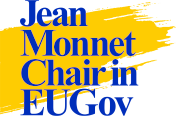Others
JMCoE Member: Javier Arregui
Role: Academic Coordinator
Degree/Master: Elective graduate course in the BA in Political and Administration Sciences (UPF) and in the BA in Global Studies (UPF)
Years of Execution: 2021-2022 onwards
Contemporary European Issues
The target groups of this course are USA and Canadian undergraduate students (coming from different disciplines) who want to increase their knowledge about the EU integration process from a political science perspective. The main objectives of this seminar are the following: 1) to trace, critically analyse and explain the process of European integration from a historical and a political science perspective; 2) to compare and contrast the US and the EU political systems in order to highlight points of convergence and divergence; 3) to show a capacity for synthesis as regards the politics and the institutions of the process of European integration and of the EU itself; 4) to understand the key concepts used in traditional European integration studies; 5) to demonstrate an appropriate use of political vocabulary when referring to the European Union integration process; 6) to understand the day-to-day functioning of the most relevant European institutions; 7) to develop further university level research skills in essay presentation, library source searches and critical thought.
JMC Member: Andrea Noferini
Role: JMC Team Member
Degree/Master: BA Political Science and Public Administration + BA in Global Studies (UPF) [Interdisciplinary Course]
Governance and Public Policies: Challenges and Opportunities within the EU
This module's objective is analyse the role of the EU in the current globalized context by taking into acount some of the relevant European public policies. Though the aim is to provide a global outlook, the module is substantially divided into two parts. The first one takes into account the foreign action of the EU in international trade, development cooperation and other international relations' processes (i.e. enlargement and neighbourhood policies). The second one focuses on the internal dimension of the EU ensuring balanced economic growth and a strong international presence for the Union. Selected policies include the ones for economic growth and innovation, the regional and investment policies (i.e. Cohesion= and the ones for increasing citizens' participation in decision-making.
The module combines analytical and theoretical content from a variety of disciplines (i.e. History, Economy, Political and Social Studies), as it allows to analyze from an interdisciplinary perspective a variety of practical cases and scenarios from the EU international scenario. The teaching section of the classes is also sided by interactive debates and other exercised aimed at the participation of students both at individual and group level.
JMC Member: Andrea Noferini
Role: JMC Team Member
Degree/Master: UPF Summer School [Exchange Programme Course]
Brexit, EU and Global World: Current Challenges in European Politics and Society
The course aims at providing a critical overview on the current challenges that national democracies will have to face in the next years. Social inequalities, global pandemic, gender equality, migrations, climate change and sustainability, the rise of nationalism(s) and populism(s) are some of these tremendous challenges. By applying a plural and interdisciplinary approach, the course combines analytical tools and categories stemming from political science, international relations, economics, European Integration studies, public policies and development economics. By providing critical tools for understanding complex phenomena (such as the European integration process, the implementation of the 2030 Agenda, the challenges of global governance, etc…) the course aims at preparing students as informed citizens and lifelong learners who care and act for the future of the planet and humanity.
